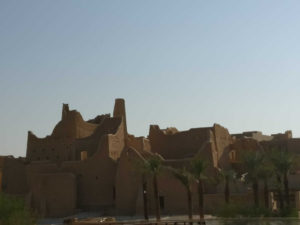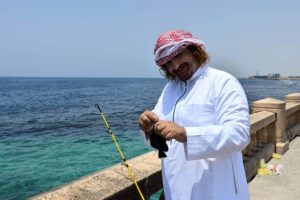Of all the countries in the world, we’ve never had one requested as much as Saudi Arabia. Over the years we’ve had a constant stream of regular clients asking us if we can find a way in there. The sheer difficulty of gaining access has long made it a holy grail to many travelers. Other than visiting on business or for Hajj and Umrah, the country has been an almost impossibility to visit on tourism. This has led to a distinct lack of travel articles, blogs and photos of the country, giving it an almost mythical feel for many. The only view people do seem to have is the one portrayed regularly in the media; an incredibly conservative Islamic kingdom with severe laws and punishment.
I’d tried for years to find a way in. Transit visas continually ended down a dead end. Rumours of tourist visas would regularly crop up but then would always fade away. And there was little chance of a foreign travel agency being invited to Saudi on business.
Fast forward to last month and I finally cracked it thanks to a random invitation from a Sheikh who was interested in what we do. I flew into Riyadh on a night flight and landed exhausted, threw on a suit and headed into the centre for my meeting. Suits aren’t the most ideal attire in temperatures of 40C+, and in I walked pouring with sweat and struggling to keep awake. The gift of a jar of Uncle Joe’s Mint Balls was a good opener, creating a beaming smile across the Sheikhs face and he was soon calling me his brother. We sat and chatted for a while, covering topics from politics to football and everything in between. As we finished he told me to go and get some well-earned rest and promised his son would pick me up later for a night on the town.

First impressions of Saudi were far away from what I’d expected. Boarding the flight, I’d expected to be surrounded by conservatively dressed men, with women in niqabs. A few were but the majority were dressed liberally. Some had long hair, one guy was wearing corduroy flares and hipster glasses, another had a Metallica t shirt on.


As I wandered Riyadh that night though, it soon became apparent those I’d seen on the flight were immigrant workers. The Saudi males were very much in local dress and women in black niqabs. We headed to the Kingdom Centre to ascend up to the Sky Tower bridge, one of Riyadh’s highest points. On the way through the mall we passed through the ladies section. The women and girls there may have been wearing clothing that has barely changed in centuries, but their way of life was clearly firmly set in modern times. They were all glued to their phones, some of them holding two, speaking on one and tapping away on the screen of the other. They were in and out of shops, carrying bags of all the latest high name brands. Even Victoria’s Secret had a store in there.
In Iran, it’s clear that many women push the boundaries as far as possible with their make-up and hair which shows through their hijabs. In Saudi, the same was noticeable with many women’s eyes and hands. Fingers would be adorned with rings, whilst their mascara filled eyelashes could be clearly seen through the narrow gap in their burka.


The following day I took a tour of the old part of the city. Right in the centre is Masmak fort, the centre of the old citadel and dating back to 1865. Inside there were photos of Riyadh from the first half of the 20th century. It looked a magical place. It was a true vision of Arabia. As I ventured out of the fort though and wandered around the area it soon became clear that this era was long gone and is never coming back. Very few of the old mud brick buildings had survived and those that had were not really in any recoverable state. The modernisation of the city had long since got rid of most of its history. Nobody seemed to miss those days, it very clearly seemed to be a city looking to its future rather than dwelling on its past.


As I was driven back to the airport later for my flight to Jeddah, I could see the construction advancing at a rapid pace. On the outskirts of the city, in what was nothing but desert a couple of years ago, was now a huge financial district nearing completion. It is to be known as King Abdullah City and so far consists of 59 skyscrapers nearing completion and covering 1.6 million square metres.
I arrived in Jeddah alone later that night and was forced to deal with walking the gauntlet of drivers hawking for business. Taxis have long been the bane of my life. None so more than after arriving late at night into a strange city. As well as the countless times around the world I’ve been ripped off, I’ve had:
So on to Jeddah, and after lengthy attempts at haggling I finally agreed to a price that was double the price I’d earlier told myself I definitely wouldn’t go above.
I’d been dreading how much I was set to spend on rip-off cabs over the next couple of days when I heard Uber has made it out to Saudi. They might have dubious business practices but they’re turning into such an essential service whilst travelling. No hassle at all; no communication issues, no haggling over prices and no wondering what time they’ll turn up.
At least that’s what I thought it would be like. The next day was a series of drivers cancelling on me or being unable to find me despite my location being clearly displayed on their GPS. I lost track of the times they called me to see where I was, costing me £2 a minute every time I had to answer. At one point I waited 45 minutes before I got an Uber, after a series of cancellations. In the meantime at least 50 standard taxis drove past. When one finally turned up and I got inside, he cancelled the ride on his app and told me he was “off Uber duty” and I had to treat him like a standard taxi and pay the rate he wanted.
The next day I decided I would give up on taxis and just walk everywhere. A big mistake and one I’ve never learned from after years of visiting desert cities. In Bahrain I decided to take myself on a walking tour of the city but ended up spending 2 hours unable to find my way out of a building site. In Qatar after arguing with taxi drivers (again) I decided to walk from the airport to my hotel in Doha. By the time I arrived my clothes were drenched wet through and I felt like I’d lost 25% of my body weight. The worst one of all though was on the outskirts of Vegas. After losing a friend who I was out with in a nightclub I decided to leave but that I would walk back to the hotel. I left through what looked like an exit but what turned out to be the service entrance. As the door closed behind me I found myself stuck behind a 10 foot gate. I drunkenly scaled it and found that it led directly onto the freeway. I spent an hour walking along a crazily busy 8 lane highway unable to find a way of crossing so that I could get back to the city. Eventually my only option was to crawl through some drains that passed under part of the freeway.
And so it was in Jeddah. Thirty minutes of walking along busy roads in the middle of August in temperatures in the mid 40’s was as little fun as you can imagine. All the scorn I’d often poured on Gulf States for the way they’d ruined their history and replaced it with shopping malls and expensive cars. And at this very moment it all made perfect sense. I could think of nothing better than to be sat down inside a nice new air conditioned mall. And that’s exactly what I did. Flagged down a taxi, headed to the Red Sea Mall. Gorged on junk food in the food court and then stocked up on expensive replica Al Hilal football gear in the club shop.


I’d struggled to find anything in Jeddah that set it apart from anywhere else in the Gulf until I later headed out to Al-Balad, the old part of the city. Unlike Riyadh, a lot of it had survived. There may be very few Saudi’s still living there anymore but now it’s packed with immigrant workers living in the cheaper crumbling houses; the only affordable part of the city that is left. The area is full of houses of totally unique architecture and like nothing I’ve seen before. They were built with coral blocks and wood – no doubt causing an ecological disaster but now creating a site like nowhere else on earth. As I wandered around I finally felt like I was in the Arabia I’d always imagined. Narrow winding streets and bustling markets.



One feeling I couldn’t’ shake off though was that I shouldn’t be there and that I was imposing on a side of Saudi that was almost unknown to the outside world. The camera around my neck probably intensified these feelings. I convinced myself I would be grabbed by the secret police at any moment, but it never came. I’d read before I visited never to take photos of people, even from a distance and to expect people to refuse even if asked. Towards the end of my visit, I finally plucked up the courage to ask a market stall holder if I could take his photo after pacing backwards and forwards past his stall for ten minutes. I expected a rapid rebuttal but was instead greeted with “Of course you can!”. I was excited about taking a great portrait shot with his Mosque adorned carpets hanging behind him. But the incredible heat was so intense that my lens was completely steamed up and no matter how many times I wiped it and waited for it to adjust to the temperature, it continued to steam up, ruining any chanced I had of getting any shot at all. This would be a running theme throughout the rest of the afternoon.
Later that evening I spoke with a local who gave me his thoughts on how things are changing in Saudi Arabia. “Mark my words, women will be able to drive here very, very soon” Within a month of returning home, the news was announced that indeed, women had finally been given the right to drive in Saudi.


I left Saudi with an urge to visit again soon to find out more about this very misunderstood nation. In some ways it felt similar to Iran – a nation of intelligent, well educated people living under a strict Islamic leadership. The people I met certainly did not seem resistant to the change and modernisation in certain attitudes and laws that appears to be coming, albeit very slowly. People are also very aware of how the country can no longer rely on oil and there seemed to be an intrigue and even excitement amongst many about what opportunities the future holds and the opportunity for people to be creative in finding new avenues for how to move the country forward.
Dylan Harris